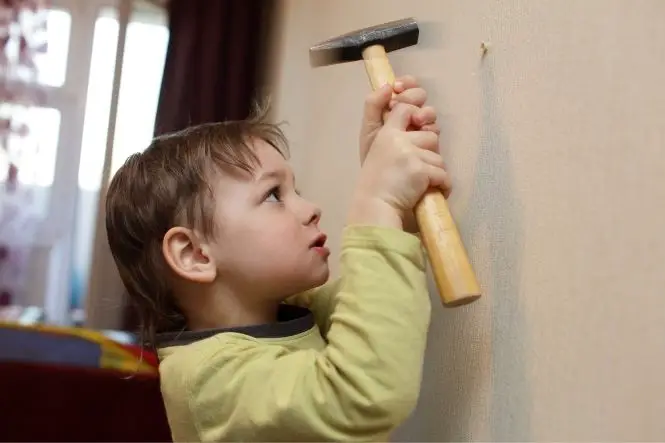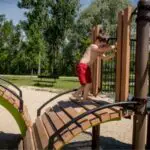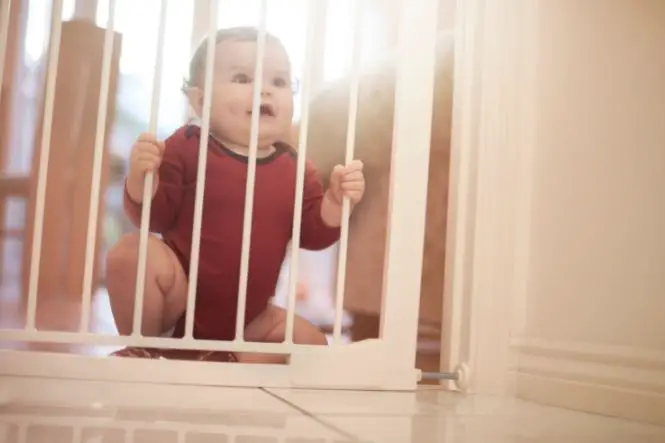DIY may seem like a jolly hobby to most people, but it really isn’t something to do unless you have a certain amount of knowledge, experience and safety awareness. Every year, 70 people are killed carrying out do-it-yourself work and 250,000 are injured – many seriously.
Whether you are an experienced enthusiast or a reluctant part-timer, taking a few minutes to plan what’s to be done could mean the difference between tackling a job safely and successfully or courting disaster, especially when are children around.
Table of Contents
Tool Box Safety
First, keep a tool box tidy for easy access and always use the cover guards which come with saws, knives and chisel blades. Always lock your tool box once you have found what you are looking for, too. It will only take you a few seconds and is the best way to keep curious little hands out of there. In the couple of minutes it takes you to concentrate on the shelf you are putting up, a child can easily get hold of a sharp tool or a handful of screws. For every accident involving a drill, there are 10 from small and supposedly ‘harmless’ bits of metal.
Rushing Leads to Accidents
Don’t under-estimate how long a job will take. If you start to run out of time, don’t be tempted to rush or take a short cut like leaving tools lying around or worse, plugged in. Tiredness is a big factor in many accidents, so give yourself a break. If a job is going to take a long time, it might be best to arrange for the children to be elsewhere while you do it, as they may well get both bored and curious, which adds pressure to you to speed up.
If you have older children who want to get involved, again, allow plenty of time and don’t get frustrated with them! Equally, make sure they know the rules: choose the right tools and protective equipment for the job (goggles and gloves are basics here). Don’t wear loose clothing or jewellery, and tie back long hair, or put it under a hat.
And remember to keep water away from anything electric – and that includes soft drinks in cans or cups.
Take Extra Care with Electrics
Make sure your older children read instructions and warnings, especially if they are using a piece of equipment for the first time. Keep manuals for equipment if you’re buying it new and explain the proper use of tools you already have.
With this in mind, buy equipment and household appliances that are made to a British or European Standard or carry an approved product quality and Safety Mark. There will be a label on the product.
If you have very small children around while you are using electrical equipment, make sure you unplug it between uses, and that you use a socket guard (as you probably would do anyway) while the tool is unplugged. Switch sockets off too, as they are very tempting for small fingers.
Paints and Chemicals
If you are painting, take extra care with old paint. Some old paint could give off harmful dust and pose a poisoning hazard if ingested by small children. You must not burn off old paint or rub it down with dry sandpaper or a power sander. Instead, clean up properly, using a high efficiency industrial vacuum cleaner with heavy duty filters (you can hire these from most large DIY stores).
If using chemicals, make sure you keep the container as high as possible off the floor while you do so, and then lock it away immediately – don’t wait until you have finished the job.
The Basics
First Aid kit – have a basic first aid kit easily accessible and make sure you know what to do with its contents. Have a charged up mobile to hand in case whatever happens puts your phone out of action. If the accident is to do with something that has been swallowed, keep the container close by so you can tell the emergency services what is was.
RCDs (Residual Current Devices) – these can respond to changes in the flow of electric current. For example, when a flex or cable is cut or an electric tool malfunctions, and direct contact is made with a mains supply conductor and earth, the RCD automatically disconnects the power supply to the equipment to reduce the risk of you being electrocuted. Again, your local electrical retailer should be able to give you advice on a range of RCDs but if you are unsure, ask an electrician to help you out with fitting them.
Ladders – these should be out of bounds for children unless supervised, and even then only at a low level. Leaving them unattended while a ladder is erect will often result in a Falling Accident. Never allow children to put ladders up themselves as they could lean them on window sills or guttering – the worst places possible!




